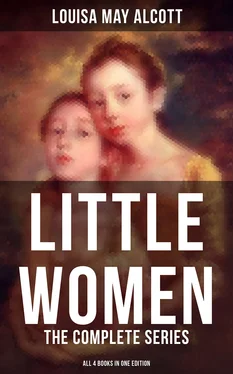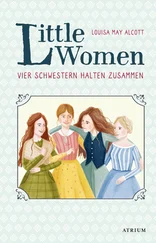There was a momentary lull, broken by Hannah, who stalked in, laid two hot turnovers on the table, and stalked out again. These turnovers were an institution, and the girls called them ‘muffs’, for they had no others and found the hot pies very comforting to their hands on cold mornings.
Hannah never forgot to make them, no matter how busy or grumpy she might be, for the walk was long and bleak. The poor things got no other lunch and were seldom home before two.
“Cuddle your cats and get over your headache, Bethy. Goodbye, Marmee. We are a set of rascals this morning, but we’ll come home regular angels. Now then, Meg!” And Jo tramped away, feeling that the pilgrims were not setting out as they ought to do.
They always looked back before turning the corner, for their mother was always at the window to nod and smile, and wave her hand to them. Somehow it seemed as if they couldn’t have got through the day without that, for whatever their mood might be, the last glimpse of that motherly face was sure to affect them like sunshine.
“If Marmee shook her fist instead of kissing her hand to us, it would serve us right, for more ungrateful wretches than we are were never seen,” cried Jo, taking a remorseful satisfaction in the snowy walk and bitter wind.
“Don’t use such dreadful expressions,” replied Meg from the depths of the veil in which she had shrouded herself like a nun sick of the world.
“I like good strong words that mean something,” replied Jo, catching her hat as it took a leap off her head preparatory to flying away altogether.
“Call yourself any names you like, but I am neither a rascal nor a wretch and I don’t choose to be called so.”
“You’re a blighted being, and decidedly cross today because you can’t sit in the lap of luxury all the time. Poor dear, just wait till I make my fortune, and you shall revel in carriages and ice cream and highheeled slippers, and posies, and red-headed boys to dance with.”
“How ridiculous you are, Jo!” But Meg laughed at the nonsense and felt better in spite of herself.
“Lucky for you I am, for if I put on crushed airs and tried to be dismal, as you do, we should be in a nice state. Thank goodness, I can always find something funny to keep me up. Don’t croak any more, but come home jolly, there’s a dear.”
Jo gave her sister an encouraging pat on the shoulder as they parted for the day, each going a different way, each hugging her little warm turnover, and each trying to be cheerful in spite of wintry weather, hard work, and the unsatisfied desires of pleasure-loving youth.
When Mr. March lost his property in trying to help an unfortunate friend, the two oldest girls begged to be allowed to do something toward their own support, at least. Believing that they could not begin too early to cultivate energy, industry, and independence, their parents consented, and both fell to work with the hearty good will which in spite of all obstacles is sure to succeed at last.
Margaret found a place as nursery governess and felt rich with her small salary. As she said, she was ‘fond of luxury’, and her chief trouble was poverty. She found it harder to bear than the others because she could remember a time when home was beautiful, life full of ease and pleasure, and want of any kind unknown. She tried not to be envious or discontented, but it was very natural that the young girl should long for pretty things, gay friends, accomplishments, and a happy life. At the Kings’ she daily saw all she wanted, for the children’s older sisters were just out, and Meg caught frequent glimpses of dainty ball dresses and bouquets, heard lively gossip about theaters, concerts, sleighing parties, and merrymakings of all kinds, and saw money lavished on trifles which would have been so precious to her. Poor Meg seldom complained, but a sense of injustice made her feel bitter toward everyone sometimes, for she had not yet learned to know how rich she was in the blessings which alone can make life happy.
Jo happened to suit Aunt March, who was lame and needed an active person to wait upon her. The childless old lady had offered to adopt one of the girls when the troubles came, and was much offended because her offer was declined. Other friends told the Marches that they had lost all chance of being remembered in the rich old lady’s will, but the unworldly Marches only said:
“We can’t give up our girls for a dozen fortunes. Rich or poor, we will keep together and be happy in one another.”
The old lady wouldn’t speak to them for a time, but happening to meet Jo at a friend’s, something in her comical face and blunt manners struck the old lady’s fancy, and she proposed to take her for a companion. This did not suit Jo at all, but she accepted the place since nothing better appeared and, to every one’s surprise, got on remarkably well with her irascible relative. There was an occasional tempest, and once Jo marched home, declaring she couldn’t bear it longer, but Aunt March always cleared up quickly, and sent for her to come back again with such urgency that she could not refuse, for in her heart she rather liked the peppery old lady.
I suspect that the real attraction was a large library of fine books, which was left to dust and spiders since Uncle March died. Jo remembered the kind old gentleman, who used to let her build railroads and bridges with his big dictionaries, tell her stories about queer pictures in his Latin books, and buy her cards of gingerbread whenever he met her in the street. The dim, dusty room, with the busts staring down from the tall bookcases, the cozy chairs, the globes, and best of all, the wilderness of books in which she could wander where she liked, made the library a region of bliss to her.
The moment Aunt March took her nap, or was busy with company, Jo hurried to this quiet place, and curling herself up in the easy chair, devoured poetry, romance, history, travels, and pictures like a regular bookworm. But, like all happiness, it did not last long, for as sure as she had just reached the heart of the story, the sweetest verse of a song, or the most perilous adventure of her traveler, a shrill voice called, “Josyphine! Josyphine!” and she had to leave her paradise to wind yarn, wash the poodle, or read Belsham’s Essays by the hour together.
Jo’s ambition was to do something very splendid. What it was, she had no idea as yet, but left it for time to tell her, and meanwhile, found her greatest affliction in the fact that she couldn’t read, run, and ride as much as she liked. A quick temper, sharp tongue, and restless spirit were always getting her into scrapes, and her life was a series of ups and downs, which were both comic and pathetic. But the training she received at Aunt March’s was just what she needed, and the thought that she was doing something to support herself made her happy in spite of the perpetual “Josyphine!”
Beth was too bashful to go to school. It had been tried, but she suffered so much that it was given up, and she did her lessons at home with her father. Even when he went away, and her mother was called to devote her skill and energy to Soldiers’ Aid Societies, Beth went faithfully on by herself and did the best she could. She was a housewifely little creature, and helped Hannah keep home neat and comfortable for the workers, never thinking of any reward but to be loved. Long, quiet days she spent, not lonely nor idle, for her little world was peopled with imaginary friends, and she was by nature a busy bee. There were six dolls to be taken up and dressed every morning, for Beth was a child still and loved her pets as well as ever. Not one whole or handsome one among them, all were outcasts till Beth took them in, for when her sisters outgrew these idols, they passed to her because Amy would have nothing old or ugly. Beth cherished them all the more tenderly for that very reason, and set up a hospital for infirm dolls. No pins were ever stuck into their cotton vitals, no harsh words or blows were ever given them, no neglect ever saddened the heart of the most repulsive, but all were fed and clothed, nursed and caressed with an affection which never failed. One forlorn fragment of dollanity had belonged to Jo and, having led a tempestuous life, was left a wreck in the rag bag, from which dreary poorhouse it was rescued by Beth and taken to her refuge. Having no top to its head, she tied on a neat little cap, and as both arms and legs were gone, she hid these deficiencies by folding it in a blanket and devoting her best bed to this chronic invalid. If anyone had known the care lavished on that dolly, I think it would have touched their hearts, even while they laughed. She brought it bits of bouquets, she read to it, took it out to breathe fresh air, hidden under her coat, she sang it lullabies and never went to bed without kissing its dirty face and whispering tenderly, “I hope you’ll have a good night, my poor dear.”
Читать дальше












